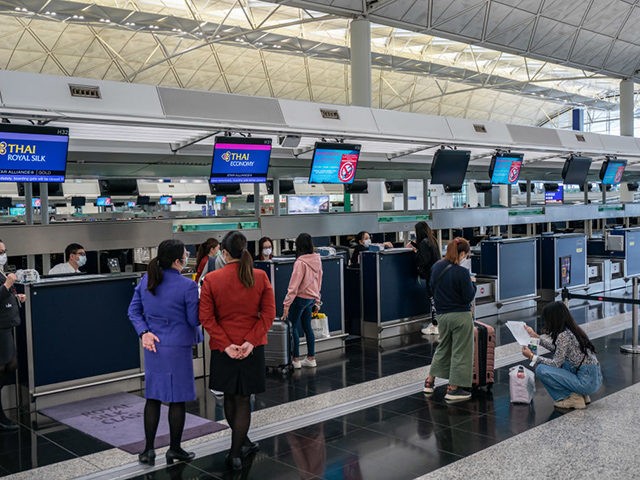Hong Kong Airlines sold out its first tickets for a half-hour tour in the sky of the city it has branded “Home Kong,” the Asian news outlet Coconuts reported on Friday, which begins and ends at Hong Kong International Airport.
The Chinese coronavirus pandemic grounded most global airlines when it became an international emergency in March. While private flights for the wealthy and some limited flights have continued, airlines have struggled to make enough money in ticket profits to remain in business. In the United States, airlines have urged Congress to pass emergency funding to their industry to ensure it continues to exist; nations like France and Italy have considered nationalizing airlines to protect them from bankruptcy.
Hong Kong remains at press time under significant coronavirus travel and gathering restrictions. City officials recently approved a plan to allow travel between Hong Kong and Singapore — whose airline industries have especially suffered as the territories are too small for “domestic” flights — but flying has otherwise largely remained off-limits without strict quarantine measures.
Hong Kong Airlines debuted its “Home Kong” 90-minute round-trip flight from Hong Kong to Hong Kong on its website, describing it as “a 90-minute sightseeing tour around your ‘home,’ with surprise lucky draw on-board and goodie bags for you to take home.” Seats on one row of a plane, for one or two people, cost 852 Hong Kong dollars, or $109.93. Longer rows with three seats cost 1,188 Hong Kong dollars ($153.29).
The airline offers exclusive, limited-edition souvenirs and flight and hotel vouchers for passengers. The flights take place at sunset, allowing for “breathtaking sunset views.”
For those seeking a fuller travel experience, the airline offers “add-on” hotel options that include buffet breakfast and dinner.
Tickets sold out in half an hour, Coconuts reported.
“The 100 people who snapped up the limited tickets will board a 90-minute flight next Sunday, departing from a very quiet Hong Kong International Airport and landing back at — you guessed it — a very quiet Hong Kong International Airport,” Coconuts reported. The outlet noted that the project is actually the second of its kind in the city, after HK Express debuted a similar sightseeing flight that also rapidly sold out. That airline described the flights as a “warm-up” for the passengers to begin getting used to the safety precautions and new travel restrictions necessary in the aftermath of the Chinese coronavirus pandemic. HK Express’s flights were about $50 each and did not feature as many add-on services, like souvenirs and raffles.
HK Express’s first flight “to nowhere” featured “media and influencers” and attracted plenty of positive attention. It also resulted in outraged protests from environmentalists who complained that flying is a heavily carbon-emitting activity and gratuitous flights that do not actually send anyone anywhere needlessly pollute the world.
“We understand Covid-19 [Chinese coronavirus] has somehow suppressed overall carbon emissions due to lockdown in many cities and countries over the past half a year. Now it [HK Express] is creating some unnecessary flights and it doesn’t create any positive benefits to the environment, only negative ones,” Edwin Lau Che-feng, executive director of NGO Green Earth, told the Hong Kong Free Press (HKFP) last week.
The airline told HKFP that it will “be fully offsetting the carbon emissions of this campaign by contributing to the Cathay Pacific Group’s Fly Greener programme to mitigate the impact.”
“The Fly Greener programme helps ensure that the CO2 generated from air travel is reduced elsewhere by purchasing ‘carbon offsets’ that come from third-party-validated projects which decrease or prevent CO2 emissions,” a spokesperson added.
Hong Kong is the latest city in Asia to pick up the trend. China’s Caixin Global reported this week that Taiwan, Japan, and Australia have also seen airlines add sightseeing flights to their itinerary, both to make up lost profits and to help keep airplanes in working order. Singapore Airlines also attempted to offer these flights, but was forced to cancel them due to environmentalist protests.
Singapore Airlines will soon begin flights to Hong Kong again after the government of that country and the Chinese-controlled leaders in Hong Kong agreed to create a travel “bubble” to allow for flights without quarantine this week. Flights between the two Asian business capitals dropped 90 percent between October 2020 and October 2019. Experts expect demand to remain low even with the “bubble” fights, but Bloomberg noted that interest among Hong Kong residents to move to purchase property in Singapore may help sell more tickets.
“They’re constantly asking about the property market — whether it’s recovering and whether prices are coming up,” Clarence Foo, a Singapore real estate professional, told Bloomberg. “Some had planned to come down earlier in the year but then Singapore imposed border controls. They know that the city’s property market seems to be more resilient now as there have been more sales and prices are low, so they want to capitalize on that.”
Hongkongers are increasingly fleeing the city in light of the Communist Party of China imposing a “national security” law on the city in May that largely negates its constitutional protections for speech and political freedoms. The law allows the Party to prosecute individuals for crimes such as “subversion of state power” and “foreign interference,” meant to be used against protesters waving British or American flags, which some have done to express support for Western human rights norms. Hong Kong’s economy collapsed in the immediate aftermath of the passage of the law.

COMMENTS
Please let us know if you're having issues with commenting.